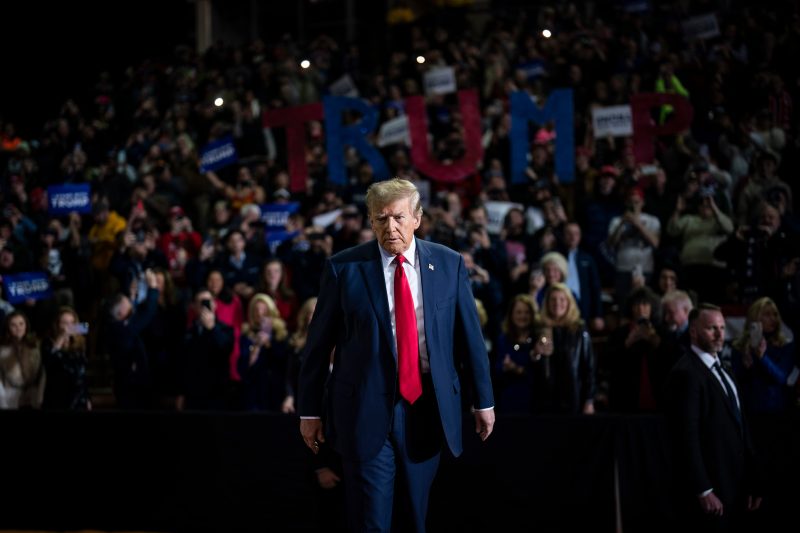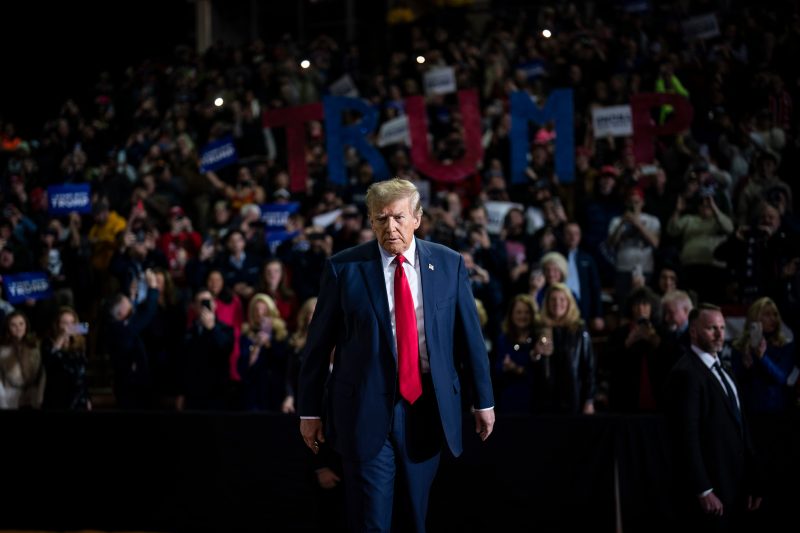
As the Supreme Court weighs whether Donald Trump is eligible to again serve as president, the justices will confront a politically fraught and fractious question: Did he engage in insurrection before and during the assault on the U.S. Capitol on Jan. 6, 2021?
The issue looms over both the case they will hear this month and the 2024 campaign. President Biden and other critics of the Republican presidential front-runner say that the attack was an insurrection under any definition and that Trump was the clear instigator. They note that more than 1,200 people have been charged with crimes related to the events of that day, with more than 850 of them convicted.
Trump himself faces 91 charges across four cases, two of which are related to his efforts to overturn the 2020 election. But insurrection is not among the charges, and he was acquitted by the Senate after the House impeached him on charges that included inciting an insurrection. Trump and his supporters say the lack of insurrection charges shows that the term does not apply.
The Supreme Court has the power to settle the matter, but it’s not clear that it will. The justices are due to hear arguments Thursday, and though they are widely expected to resolve whether he is eligible, they could choose to decide the case on narrow grounds that sidestep the question of insurrection.
The case centers on a Civil War-era provision of the Constitution and raises issues that have lain dormant for more than a century. Interviews with legal scholars and historians reveal sharply divergent opinions that do not always follow ideological lines, reflecting why some believe it’s so difficult to predict where the court’s six conservatives and three liberals will land.
“It’s hard to say where the court’s going to go on this,” said University of Notre Dame law professor Derek Muller. “There’s just so many ways.”
Colorado’s top court concluded in December that the attack was an insurrection and that Trump is an insurrectionist who is barred by the Constitution from serving as president again. The Colorado justices ruled he could not appear on the state’s primary ballot but put their decision on hold while Trump pursued an appeal.
The Supreme Court agreed to consider the Colorado challenge and will probably issue a ruling that addresses whether Trump can appear on ballots for all states. Maine’s secretary of state has also ruled Trump ineligible, but a state court has said the Supreme Court needs to have its say before the secretary of state can make any decision.
The justices — three of whom were nominated by Trump, cementing a conservative majority — could rule in his favor without ever answering whether the attack was an insurrection or whether Trump is an insurrectionist. The court could avoid those questions by determining that Trump never took an oath that subjects him to the part of the Constitution barring insurrectionists from office; finding that the presidency is not covered by that provision; or ruling that Congress, rather than the judiciary, gets to decide who is barred from office.
The case nonetheless poses an issue that scholars have wrestled with in recent months — how Americans after the Civil War believed the country should deal with former government officials who participate in insurrections and try to return to office, and whether Trump’s actions qualify.
Three years after the end of the war, in 1868, the United States adopted the 14th Amendment and its Section 3, which bars from office those who took an oath to the Constitution if they “shall have engaged in insurrection or rebellion against the same, or given aid or comfort to the enemies thereof.” The provision was adopted to keep Confederates from returning to power but was written broadly enough to account for future insurrections.
Voters and lawyers laid the groundwork for the legal challenge to Trump two years ago, when they filed a lawsuit that resulted in the removal of a county commissioner in New Mexico because of his role in the Jan. 6 attack. The theory gained currency in August with the publication of a draft of a law review article by two conservative law professors, William Baude of the University of Chicago and Michael Stokes Paulsen of the University of St. Thomas.
Gerard Magliocca, an Indiana University law professor who served as an expert witness for those challenging Trump’s candidacy, said during testimony in the Colorado case that insurrection as it was understood in the 1860s was “any public use of force or a threat of force by a group of people to hinder the execution of the law.”
Officials at the time interpreted Section 3 expansively and, even before it was adopted, often considered remote links to insurrection to be disqualifying, he said. Congress in one case declined to seat a representative-elect from Kentucky because he had written a letter-to-the-editor early in the Civil War advocating violence against Union soldiers if they entered his state. It also barred a representative-elect from Maryland because he had given $100 to his son before he joined the Confederate army, Magliocca testified.
“During Reconstruction, ‘engage in insurrection’ was understood broadly to include any voluntary act in furtherance of an insurrection against the Constitution, including words of incitement,” he said.
Trump’s pugnacious speech to supporters on the Ellipse on Jan. 6 — as well as his tweets before and on that day — featured prominently during the hearing in Colorado. Trump urged his supporters to come to Washington for a “wild” gathering, lied about how the 2020 election was conducted, and told the crowd to march to the Capitol and “fight” for him as Congress debated finalizing Biden’s victory.
“We fight like hell, and if you don’t fight like hell, you’re not going to have a country anymore,” he told the crowd in a speech that also mentioned the need to remain peaceful.
Trump’s backers attacked police officers and besieged the Capitol, delaying the certification of the election results for hours. Amid the assault, Trump lambasted Vice President Mike Pence, who was overseeing the joint session of Congress. Trump waited hours to tell members of the mob to go home, and told them he loved them as he directed them to disperse.
Trump remained at the White House during the attack, watching it on television. The House committee that investigated the Jan. 6 assault recommended that he be charged with four crimes for his role in the day’s events, including inciting or assisting an insurrection.
But Robert Delahunty, a Claremont Institute fellow who testified as an expert for Trump in the Colorado case, said someone would have to take up arms to be considered an insurrectionist — something Trump did not do.
And, Delahunty noted, Section 3 is focused on those who commit insurrection against the Constitution. “It’s not just any plain-vanilla insurrection,” he testified, adding that there is no clear definition of insurrection against the Constitution. Congress, not the court, should be the one to set that definition, he said.
Those who were at the Capitol on Jan. 6 have been charged with assaulting officers, destroying government property, obstructing an official proceeding, engaging in seditious conspiracy and committing other crimes. Neither Trump nor anyone else has been charged with insurrection. Prosecutors have a range of charges they can file in serious cases and typically go with the ones that are easiest to prove beyond a reasonable doubt, said University of Maryland law professor Mark Graber.
“It was never considered an element of Section 3 that you need a criminal conviction,” he said, noting that after the Civil War many former Confederates were disqualified from office even though they had not been charged with insurrection or treason.
The Supreme Court case raises difficult questions, however, about who determines what qualifies as an insurrection and when someone is subject to Section 3. An expansive interpretation of Section 3 by the Supreme Court could lead to a spate of challenges against candidates for president and other offices. Recently, four voters in Illinois asked the state elections board to bump Biden from the ballot for his border policies, alleging he has violated Section 3 by giving aid to the country’s enemies.
Samuel Issacharoff, a law professor at New York University, said in an interview that he doesn’t believe there is a clear definition for insurrection and is troubled by the idea that courts or election officials could prevent candidates from running.
“I think one has to be careful when we’re starting to look at law professors using 19th-century dictionaries to ban somebody from the political process who got 75 million votes three years ago,” he said.
Issacharoff said he opposes Trump and believes he’s a danger to democracy. But, he added, “I think there’s another danger to democracy, which is the exclusion of candidates who the people want to vote for.”
Jill Lepore, a Harvard University history professor, said senators should have prevented Trump from running again when they considered his impeachment. Now, it’s up to the courts.
“Republicans in Congress have essentially forsaken their constitutional duty,” she said by email. “Do I wish they had not? Yes. But that doesn’t change the plain language of the Fourteenth Amendment, which disqualifies Trump. You may not like it. I may not like it. Who knows, the majority of the country may not like it. But that the majority of the country does not like it or even that it has not heard of it is not an argument against it.”
Stanford Law professor Michael W. McConnell said in an interview that it is difficult to argue that Trump engaged in insurrection because he did not tell the crowd to attack anyone.
“To say he engaged in the insurrection, even if it was an insurrection, seems like an enormous stretch,” said McConnell, who teaches a course on the post-Civil War changes to the Constitution, including enforcement of Section 3. “What did he do? We’ve all watched his horrific appearance at the Ellipse. He wasn’t telling them to attack Congress. He was telling them to march on the Capitol and to express their anger at what he wanted them to think was a stolen election.”
Whether the attack on the Capitol was an insurrection is a more complex question, said McConnell. “Insurrection was a very serious thing — not a mere riot or rebellion,” he said. “We should be very careful about defining it down to include riots.”
Scholars have also been debating whether the authors of the 14th Amendment meant for Section 3 to apply to the presidency, and for Congress to take further action before it could be enforced.
Kurt Lash, a University of Richmond law professor, said that “this cannot be adequately researched, vetted, debated and arrived at some type of scholarly consensus” before the election, let alone before the Supreme Court has to rule on the case. He and his peers have spent recent months researching speeches, debates and other records from the years after the Civil War to understand what people at the time considered to be the sweep of Section 3.
Without a clear answer on whether the presidency is subject to Section 3, Lash said, Trump should be allowed on the ballot. The United States is governed by the idea “that we’re ruled by the people, that our fundamental rules come from the considered deliberation and decision of the people themselves,” he said. “So you look for evidence that they engaged in considered deliberation, and here I don’t think we have it.”
Graber, the University of Maryland law professor, disputed Lash’s notion that democracy is better served by allowing Trump’s name to appear on the ballot. In most European countries, “the only people who are eligible for democratic election are people who play by the democratic rules,” Graber said. “So there’s a democratic case for disqualification. There are democratic values on both sides.”
Ann E. Marimow contributed to this report.

